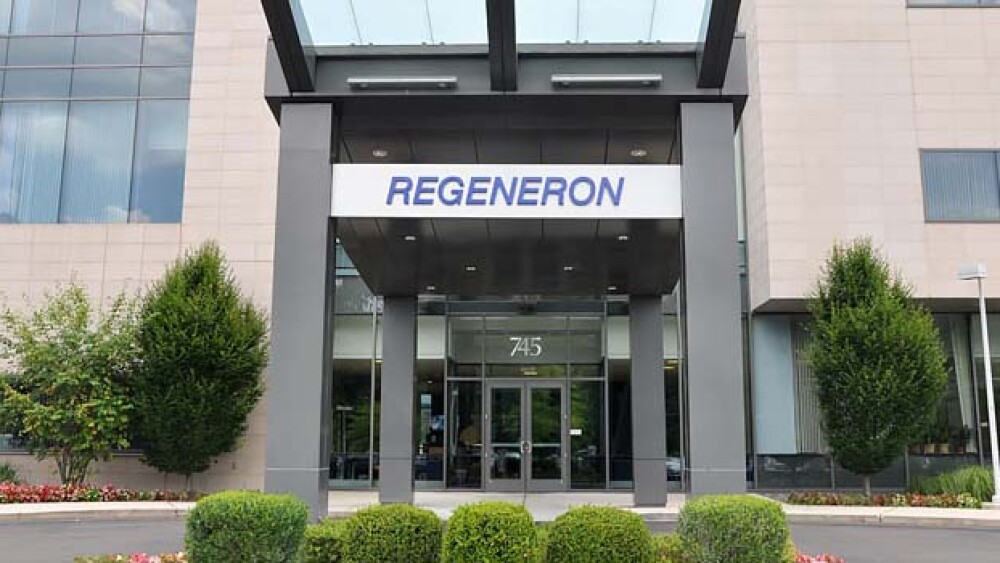Under the terms of the agreement, Regeneron is paying $400 million upfront to Alnylam and acquiring another $400 million in equity at a price per share of $90, or 4.44 million common shares.
Regeneron Pharmaceuticals and Alnylam Pharmaceuticals announced a collaboration deal to discover, develop and commercialize treatments for the eye and central nervous system (CNS), as well as several targets expressed in the liver, utilizing RNA interference (RNAi).
Under the terms of the agreement, Regeneron is paying $400 million upfront to Alnylam and acquiring another $400 million in equity at a price per share of $90, or 4.44 million common shares. Alnylam will be eligible for up to another $200 million in milestone payments during early clinical development for the eye and CNS programs.
Alnylam plans to work exclusively with Regeneron to discover RNAi therapeutics for the two primary indications, eye and CNS diseases. Regeneron will lead development and marketing for programs that target the eye and Alnylam will be eligible for milestone payments and royalties. The two companies will work together to advance and alternate heading the CNS programs, with the lead group holding global development and commercial responsibility. For CNS programs, both companies will be able to participate equally in the other’s programs at the point of candidate selection.
Regeneron and Alnylam indicate they plan to advance programs directed to 30 targets, with many of them being advanced into clinical development during the initial five-year discovery period. That also includes an option to extend the partnership.
Regeneron will pay Alnylam $2.5 million in funding at the initiation of a program and another $2.5 million in annual discovery funding. This amounts to approximately $30 million in potential annual discovery funding to Alnylam.
“At Regeneron we believe the best use of our resources is to invest in potentially game-changing science that will yield innovative medicines for patients with serious diseases,” stated George D. Yancopoulos, Regeneron’s president and chief scientific officer. “This collaboration couples proven and emerging RNAi technology, which holds important promise in many diseases, with Regeneron’s world-leading genetics research and target discovery engine.”
Regeneron manufactures and markets Eylea for wet age-related macular degeneration (wet AMD), diabetic macular edema or diabetic retinopathy and macular edema, as well as Dupixent for atopic dermatitis. Alnylam markets Onpattro (patisiran) for the polyneuropathy caused by hATTR, an inherited, progressive disease caused by a genetic mutation that causes a buildup of misfolded transthyretin (TTR) protein.
The collaboration will leverage Regeneron’s expertise in genetic research. In addition to this deal, Regeneron is heading a consortium to sequence the DNA of 500,000 people in the UK. It will merge that expertise with Alnylam’s RNAi technology.
“This new industry-leading alliance is aimed at realizing what we believe to be a significant opportunity for RNAi therapeutics as potentially transformative medicines for ocular and CNS diseases,” stated John Maraganore, Alnylam’s chief executive officer.
He went on to say, “Importantly, the alliance structure enables Alnylam to continue to build its industry-leading pipeline of RNAi therapeutics while retaining significant product rights. In addition, the near-term payments under this new agreement will strengthen Alnylam’s balance sheet with over $2 billion in pro forma cash upon closing of the transaction, supporting our global efforts to develop and commercialize multiple products as potentially breakthrough medicines and advance our profile toward sustainable profitability.”
The liver part of the partnership will include evaluating anti-C5 antibody-siRNA combos for C5 complement-mediated diseases. Part of these programs will involve studying Regeneron’s pozelimab (REGN3918), currently in Phase I, with Alnylam’s cemdisiran, currently in Phase II. Alnylam will keep control of cemdisiran monotherapy development. Regeneron will lead combination development.
The two companies will equally split investment and potential future profits on the monotherapy program. Alnylam will receive royalties on any possible combination products that get commercialized. In the other liver programs, the two companies will alternate leading them and equally split any profits.
They will also continue their previously-announced partnership to identify RNAi therapeutics for nonalcoholic steatohepatitis (NASH), a disease of the liver.
Yancopoulos told STAT, “It’s about the future, and it’s about synergies. We’re not going to be making the standard deals where the companies are just hoping to acquire an asset. We’re going to do the opposite. We’re looking for people with which we can do greater things together.”





